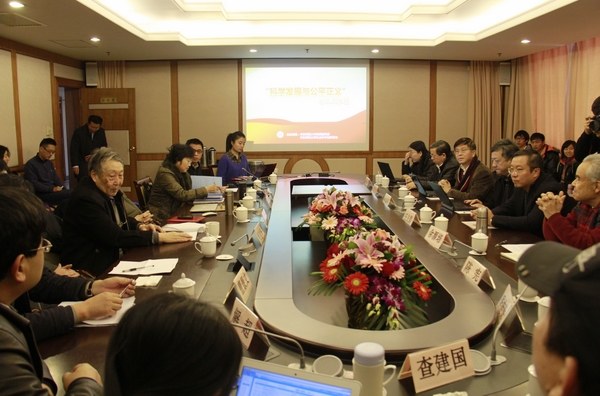Academic forum for equal justice held in Shanghai

The academic forum for “Scientific Development and Equal Justice” is held.
The academic forum for “Scientific Development and Equal Justice” was hosted by the Publicity Department of East China Normal University and held on December 9th at ECNU’s campus in Shanghai. Shen Guoming, the full-time vice-president of the Shanghai Social Sciences Association, and Yu Yuanpei, professor of Fudan University were among the attendees.
Yu reiterated the high importance of the Report of the Eighteenth National Congress of the Communist Party of China’s statement, "Fairness and justice are inherent requirements of socialism with Chinese characteristics." He elaborated that this statement is reflected in three areas: firstly, having equal justice embody and reflect diversity is increasingly a requirement of the Chinese people, and permeates every detail of further reform and opening-up in China; secondly, with regard to social interactions, equal justice facilitates fair interpersonal relations, ensuring that individual interests do not undermine the interests of others and society; thirdly, as a political category, equal justice is the socio-political system and government’s stance in representing equal and proper distribution, rights and obligations, and keeping stable and harmonious social order.
From a legal perspective Shen stated that the law cannot singlehandedly root out all instances of injustice, but that the rule of law could alleviate those suffering from injustice. Rather than overstating its function, Shen maintained that we should give accurate weight to the law’s applications and capabilities. Currently, there is not only a problem of the law not being utilized to its full capacity, but also the opposite problem, whereby enforcement and litigation excessively intervene in social life. We cannot resort to legal means to resolve every social altercation; other social norms should not be ignored. With respect to achieving equal justice, the law cannot do everything. Shen concluded that going to either extreme—disregard for the law’s validity or blind pursuit of legislation to regulate every interaction—will subvert the interoperability of the legal system with broader social norms and undercut the authority of the law.
Speaking from an economic perspective, Chen Xian, executive director of the Economics School of Shanghai Jiao Tong University, proposed that equal justice should be implemented based on the principle of distribution. He noted that income distribution is often a barometer of societal justice and equality. Other attendees also elaborated on their own understandings of equal justice from different disciplines, such as politics and sociology.
The Chinese Version appeared on Chinese Social Sciences Today, No. 384, Dec.14, 2012.
(Translated by Yang Lu)
The Chinese link:

 PRINT
PRINT CLOSE
CLOSE